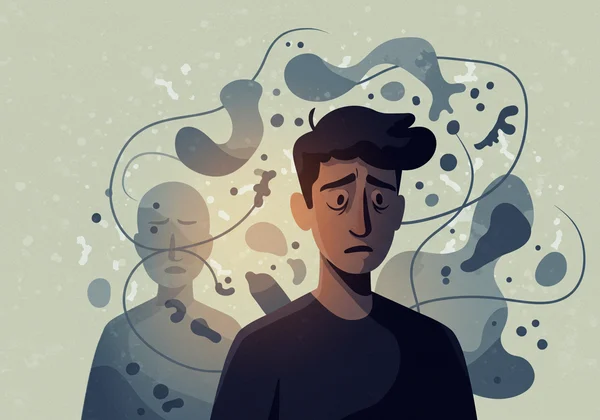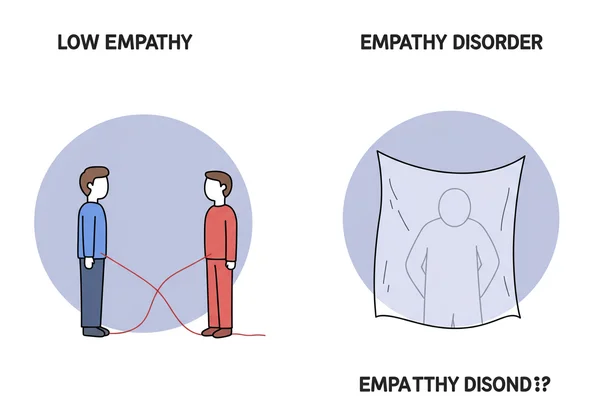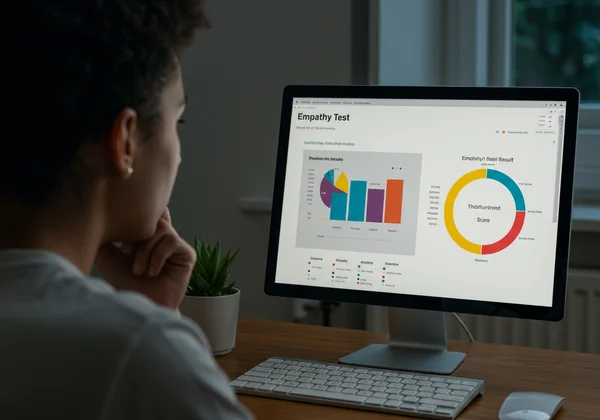Empathy Test Insights: Low Empathy vs. Empathy Disorders
November 13, 2025 | By Penelope Dean
Have you ever found yourself wondering if you feel things as deeply as others? Or perhaps you're concerned about someone who seems emotionally distant. It's a common worry to question where one stands on the empathy spectrum. How do I know if I'm empathetic? This question often leads down a rabbit hole of confusion between simply having low empathy and the presence of a more serious clinical disorder. Understanding this distinction is the first step toward meaningful self-awareness and personal growth.
This guide will help you navigate the complex world of empathy. We'll explore the difference between a situational lack of empathy and recognized clinical conditions. An empathy test can be a powerful tool for self-reflection, offering a snapshot of your current emotional landscape. Let’s clarify what these insights mean for your journey toward better understanding yourself and others. A great place to start is to discover your empathy score.
What is Low Empathy? Understanding the Spectrum
First, it’s crucial to understand that empathy isn't an on-or-off switch; it’s a spectrum. Having low empathy does not automatically mean something is wrong. It often means a person has difficulty understanding or sharing the feelings of others. This can be a temporary state or a more consistent personality trait, influenced by numerous factors throughout one's life.
Low empathy is far more common than many people realize. It doesn't make someone a bad person, but it can create challenges in forming deep, meaningful connections. Acknowledging this trait opens the door to cultivating stronger interpersonal skills and improving your relationships at home, work, and in your community.

Common Factors & Causes of Low Empathy
Empathy levels can fluctuate. Several factors can contribute to experiencing a temporary or prolonged state of low empathy. Understanding these causes of low empathy can provide context and reduce self-judgment.
One of the most common culprits is burnout or extreme stress. When you're overwhelmed by your own problems, it becomes incredibly difficult to find the emotional capacity to connect with someone else's struggles. Childhood experiences also play a significant role; an environment that didn't model or encourage empathetic behavior can stunt its development. Sometimes, it’s simply a matter of perspective—we find it harder to empathize with experiences far removed from our own.

Signs You Might Experience Low Empathy
Wondering if your empathy levels are on the lower side? Certain signs might indicate a tendency toward lower emotional intelligence. These are not diagnoses but rather observations that can guide self-reflection.
You might find yourself struggling to see things from other people's viewpoints or quick to offer solutions instead of emotional support. People with lower empathy often come across as critical or insensitive without meaning to. They may also have a hard time predicting how their words or actions will affect others, leading to misunderstandings. If this resonates, it could be a sign that developing your empathy is a valuable area for personal growth. An online empathy quiz can provide a structured starting point.
Exploring "Am I a Narcissist?": The Nuance
The question "Am I a narcissist?" is a frequent search query, often stemming from concerns about low empathy. It’s important to draw a clear line here. While a profound lack of empathy is a core feature of Narcissistic Personality Disorder (NPD), having low empathy does not make you a narcissist.
NPD is a complex clinical condition characterized by a pervasive pattern of grandiosity, a need for admiration, and a lack of empathy. In contrast, someone with low empathy might simply struggle with perspective-taking but doesn't necessarily possess these other traits. They may feel remorse when they realize they've hurt someone, a reaction often absent in those with clinical NPD. It's the difference between a skill that needs development and a deeply ingrained personality structure.
Empathy Disorders: Clinical Conditions Explained
Now, let's shift our focus to empathy disorders. This term can be slightly misleading, as a lack of empathy is typically a symptom of a larger, clinically diagnosed personality disorder rather than a standalone condition. It's where the inability to connect becomes chronic, pervasive, and significantly impairs a person's life and relationships.
Understanding these conditions helps put low empathy into a broader context. It highlights the vast difference between having a developmental blind spot and living with a serious mental health condition. This knowledge is crucial for fostering compassion and reducing the stigma associated with both.
Defining Clinical Empathy Disorders
When psychologists refer to clinical empathy disorders, they are generally speaking about conditions listed in the Diagnostic and Statistical Manual of Mental Disorders (DSM-5). These are not temporary states but enduring patterns of behavior.
These conditions involve a fundamental inability to attune to the emotional states of others. This deficit isn't situational; it's a core part of how the individual navigates the world. The impact is severe, often leading to volatile relationships, social isolation, and an inability to function effectively in society. Professional diagnosis is essential, as these conditions require specialized therapeutic intervention.

What Mental Illness Causes Lack of Empathy?
Several personality disorders are characterized by a significant lack of empathy. Answering the question what mental illness causes lack of empathy? requires a careful, non-diagnostic overview. The most well-known are those within the "Cluster B" category.
Narcissistic Personality Disorder (NPD) involves a lack of empathy coupled with a sense of entitlement and grandiosity. Antisocial Personality Disorder (ASPD) is marked by a disregard for the rights and feelings of others, often leading to manipulative or harmful behavior without remorse. Borderline Personality Disorder (BPD) can also involve empathy deficits, though it is more complex, often involving intense and unstable emotional states. It is critical to remember these are serious diagnoses made by qualified professionals.
Key Distinctions: Low Empathy vs. Disorder
Understanding the key distinctions between having a low empathy trait and a clinical disorder is essential for responsible self-assessment. Let's break down the primary differences:
- Awareness and Intent: A person with low empathy can often recognize their deficit and may feel bad about it. In a clinical disorder, there is typically a lack of awareness or concern about the impact their behavior has on others.
- Scope: Low empathy might be more pronounced in certain situations (e.g., at work) but less so in others (e.g., with close family). In a disorder, the lack of empathy is pervasive across almost all areas of life.
- Malleability: Someone with low empathy can often develop their skills through conscious effort, practice, and tools like an empathy scale. For a personality disorder, change requires intensive, long-term psychotherapy.
- Functionality: While low empathy can create social friction, it doesn't usually prevent a person from holding a job or maintaining basic relationships. A clinical disorder severely impairs one's ability to function.
Your Path to Self-Awareness: Beyond Diagnosis
The goal of exploring empathy is not to label yourself or others. It is about embarking on a path to greater self-awareness and fostering deeper connections. Moving beyond the fear of diagnosis allows you to focus on what truly matters: personal growth.
Whether you score high or low on an empathy scale, that number is simply a piece of data. It’s a starting point for reflection, not a final judgment. The real power lies in what you do with that information. It’s an invitation to become more curious about yourself and the people around you, paving the way for a more fulfilling life.
Why Understanding Your Empathy Matters
Understanding your empathy is foundational to building strong social skills. It is the bedrock of effective communication, successful leadership, and lasting relationships. When you can genuinely understand another person's perspective and feel a portion of their emotional state, you can navigate conflicts, provide meaningful support, and build trust.
Improving empathy enhances every facet of your life. In your career, it can make you a better leader and collaborator. In your personal life, it deepens your bonds with loved ones. It is a skill that, once cultivated, pays dividends in happiness and connection. The first step is getting a clear baseline, which you can do when you take our free test.
Using an Empathy Test for Insight
This is where an online empathy test becomes an invaluable tool. It offers a structured, private way to explore your empathetic tendencies without the pressure of a clinical setting. The results are not a diagnosis but a mirror for self-reflection. They provide personal insight into your strengths and areas for potential development.
Our comprehensive test is designed based on psychological principles to give you a comprehensive look at your empathy score. You can choose a free summary or an advanced AI-powered report that offers a detailed breakdown and actionable advice. This tool empowers you to take control of your emotional development. Ready to start your journey?

Empower Your Journey to Deeper Connection
Understanding where you stand on the empathy spectrum—from everyday low empathy to the complexities of clinical conditions—is a profound step towards enriching your relationships and fostering personal growth. The most important takeaway is that having lower empathy is a common human experience and a potential area for growth, not a reason for shame. True clinical disorders are rare, complex conditions that require professional care.
Remember, online tools are here to provide insight, not a diagnosis. Taking responsibility for your emotional intelligence is one of the most empowering steps you can take. Your journey to understanding yourself better begins with a single, simple action. Take our comprehensive test today to discover your unique empathy profile and unlock your potential for deeper connection.
The Takeaway
How do I know if I truly lack empathy?
You might suspect you have low empathy if you consistently find it difficult to understand other people's emotional reactions, feel indifferent to their problems, or are told you come across as insensitive. A structured self-assessment, like an online empathy test, can provide objective insights beyond your personal suspicions.
Can an online empathy test determine if I have an empathy disorder?
No, absolutely not. An online empathy test is a tool for self-reflection and personal growth, not a diagnostic instrument. If you are seriously concerned about a clinical condition, it is essential to consult with a licensed mental health professional for a proper evaluation. Our tool is designed to help you explore your results for educational purposes only.
What are the common causes of low empathy?
Common causes include high levels of stress or burnout, certain aspects of one's upbringing, a lack of exposure to diverse perspectives, and some personality traits. It is not a fixed characteristic and can be influenced by many life circumstances.
Is it possible to improve empathy if I have low empathy?
Yes, definitely! Empathy is a skill that can be developed. Practices like active listening, reading fiction to explore different perspectives, mindfulness, and consciously trying to understand others' feelings can significantly build your "empathy muscle" over time.
What's the difference between low empathy and being a narcissist?
Low empathy is a trait where someone struggles to understand or share others' feelings, but they can often learn and grow. Narcissism, specifically Narcissistic Personality Disorder (NPD), is a clinical diagnosis involving a pervasive lack of empathy combined with grandiosity, a constant need for admiration, and a sense of entitlement. Having low empathy does not make someone a narcissist.